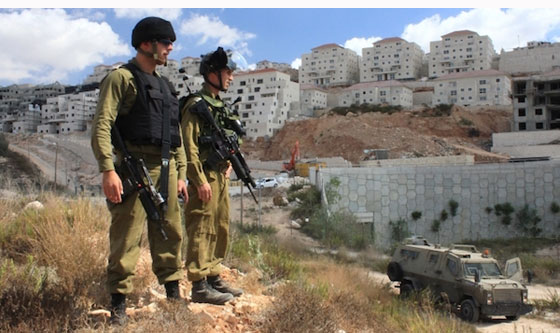This Is How Settlers Take Over Palestinian Land
PALESTINE - ISRAEL, 9 May 2016
From audacious fraud and forgery to military seizures for ‘security needs’ and the ‘public good’ to dusting off antiquated Ottoman laws, the Israeli settlement enterprise has no shortage of tools for taking over Palestinian land in the West Bank.
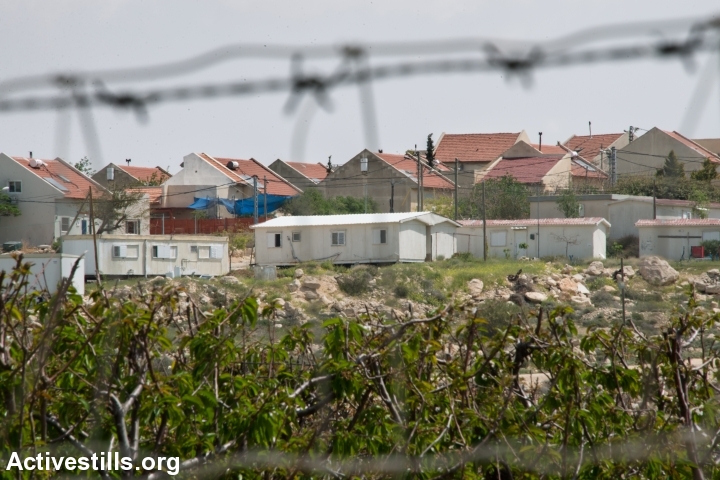
Mobile homes and fruit trees represent the expanding edges of the Israeli settlement of Ma’on, which is taking land from the South Hebron Hills village of Al Tuwani, West Bank, April 2, 2014. (photo: Ryan Rodrick Beiler/Activestills.org)
On February 9, 2004, Abdelatif Hassan Samarin, a resident of the West Bank village of Burqa, just a few miles east of Ramallah, woke up before dawn. After his morning prayers, Samarin drank two cups of sweet tea with mint, meant to combat the morning chill of winter, packed some clothing into a suitcase that his son — who was 78 at the time — bought him the day before at a nearby village.
The drive to Ramallah, and from there to Allenby Bridge border crossing with Jordan, left him exhausted. So exhausted, in fact, that he slept the entire hour-and-a-half drive to Queen Alia International Airport. He woke up only after the driver, whom he recognized from his accent, nudged his shoulder to announce that he had arrived, and that Samarin owed him 10 dinar.
But despite the exhaustion and the thousands of miles ahead of him, Samarin did not think even for a second of backing out of his journey. Not someone like him, someone who had seen it all. He was a spry 37 or 38 (who knows exactly? birth certificates, after all, were not issued to his mother who gave birth to Samarin in a cave) when the British kicked out the Turks at the end of 1917. He was 67 when the British left and the soldiers of the Arab Legion arrived toward the middle of 1948. And he was 86 when he saw those same Jordanians defeated by the Israelis in 1967.
He became accustomed to Israeli rule after living nearly a third of his life under Israeli military occupation. Deep down he even appreciated the Israeli settlers’ own version of ‘sumud’ — an Arabic term that has become synonymous with Palestinian steadfastness. He even got used to his new neighbors, who just 18 months earlier had set up what looked like plastic, white blocks on a nearby hill. This, despite the fact that the name they gave their settlement — Migron — sounded strange to him, and despite the fact that his new neighbors’ trucks unloaded and built some of those strange plastic blocks on a plot of land Samarin had inherited from his father when he passed away in 1897.
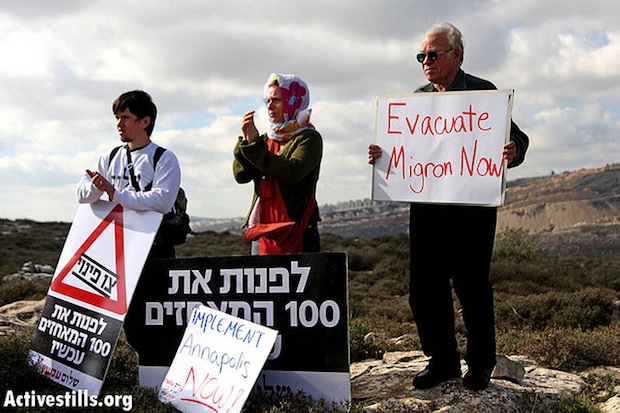
Israeli activists from Peace Now call to evacuate the settlement outpost of Migron settlement during a demonstration in 2008. (photo: Activestills)
Thirty-eight hours after he left his West Bank home, Samarin landed in Los Angeles International Airport. Two hours later he was already sitting in a hotel room in Tustin, Orange County, a few miles south of LA. And then, just a day after his arrival, Samarin made his way to a small post office in the center of town, where a Pakistani notary by the name of D.K. Shah was waiting for him.
The meeting between the two was short and to the point. Samarin identified himself to Shah, and signed a an irrevocable power of attorney, in which he granted to the “Al Watan” company all the rights to his land, which back in 1957 the Jordanians had listed as Plot 26 in Bloc 23. Samarin, like most of his generation, did not know how to read and write, although one of his great-grandchildren had made it his personal mission to teach the patriarch of the family how to scribble his signature. That explains, for instance, why Samarin didn’t notice that he was signing a document that misspelled his name and did not mention just how much money he would receive in exchange for his 5.6 acre plot of land. Either way, after a few minutes Samarin, who was 125 years old at the time, left Shah’s office content, disappearing into the noisy chaos of Los Angeles, never to be heard from again.
At this point, you’ve probably gathered that the story of Abdelatif Hassan Samarin, D.K. Shah and Al Watan never actually took place. The full story of how the settlers of Migron — with the help of both the Binyamin Regional Council and the Amana settler movement — tried to take over the plot of land that belonged to Samarin, who in reality passed away in his village in 1961 at the age of 80, can be found here.
This is just one of dozens of stories of forgery I have encountered in my work in the West Bank over the past several years. The names of the “buyers” and the “sellers,” as well as the places where the “transactions” were made, change from case to case. But in the majority of cases, that same settler company owned by the Binyamin Regional Council and Amana — which ironically is called “Al Watan” (homeland, in Arabic) — was involved in fraud. And despite the fact that the names of those involved in these shady deals are well known to the police, not a single one of them has been put on trial. Meanwhile the fraudulent purchases continue — especially of land adjacent to settlements, located between the separation barrier and the Green Line.
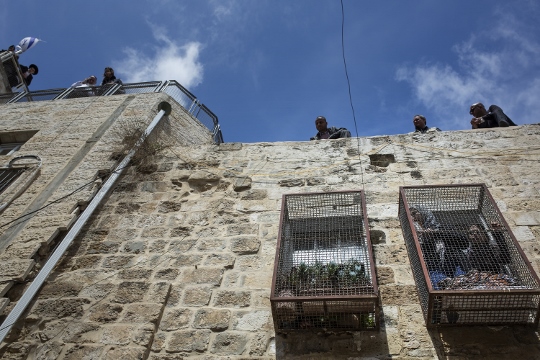
Settlers and Border Policemen stand on the roof of the Sub Laban family home, Old City of Jerusalem. A right-wing settler organization has been trying to expel the family from their home, in the Muslim Quarter, for the past 35 years. (photo: Tali Mayer/Activestills.org)
The fact is that the vast majority of stolen land in the West Bank was simply transferred to settlers, rather than purchased fraudulently by them. There was no need to purchase it — the State of Israel created and institutionalized a number of official tools through which the process of dispossession and taking control of land could be done with ease:
The first of these tools is called “seizing land for military needs.” For over a decade following the 1967 war, IDF commanders in the West Bank signed dozens of seizure orders to take control of land for “security needs,” through which over 40 settlements were established on thousands of acres of privately-owned Palestinian land.
The Israeli authorities established that these military orders were “necessary for security,” basing their claims on a decision by the High Court of Justice, according to which settlers could help the IDF control a territory with a hostile population. The Palestinian landowners, who were well aware of the farce of security claims, petitioned against the baseless military orders. The High Court did what it had to do and rejected their petitions, paving the way for the bulldozers to pave the way for new settlements in the West Bank.
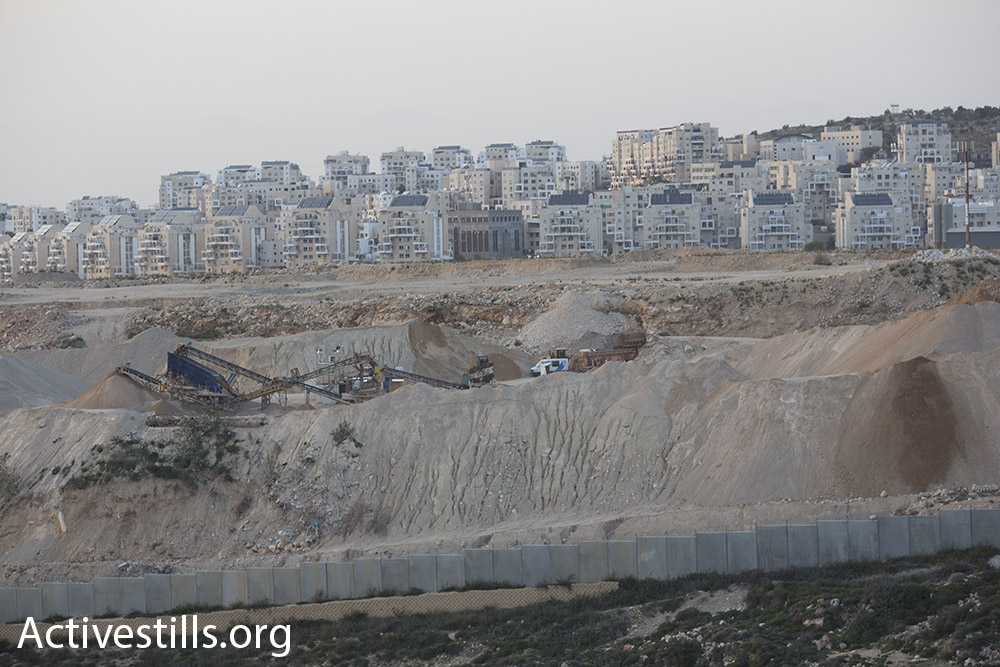
Beyond the separation wall, bulldozers expand the Modi’in Illit settlement bloc. (photo: Oren Ziv/Activestills.org)
This could have gone on for years, had it not been for the settlers of Elon Moreh, who insisted on telling the High Court the truth in response to a petition by a Palestinian landowner, who claimed that the settlers established their homes on privately owned land. In response, the settlers told the truth: as opposed to the deceitful stance of the government, the settlement was not established for security purposes, but for ideological reasons. Furthermore, they made clear that their settlement was not “temporary” as the state argued to the High Court — a claim that would help the state continue and deploy the claim of “judicial review,” which had already served it so well in similar petitions.
Thus, as opposed to the expectations of all those involved, the High Court was forced to rescind the order. Prime Minister Menachem Begin declared that “there are judges in Jerusalem,” and that the state would evacuate the settlement. By doing so, the state officially backtracked from using the military for the purpose of establishing settlements. But as opposed to Elon Moreh, the High Court did not order the state to evacuate the other 40 settlements that had been established in much the same way.
When the rule of law disappears
Parallel to its wholesale use of military orders for the purpose of capturing land, Israel also established settlements through use of expropriation orders for “the public good.” The settlement of Ma’ale Adumim necessitated the expropriation of nearly 7,000 acres from Palestinian villages east of Jerusalem.
What Begin failed to mention in his now-famous remarks, is that aside from judges, Jerusalem also had some very clever clerks with a background in law. Those same clerks, who knew the Ottoman land laws implemented in the second half of the 19th century, knew that the laws dictated that in order to maintain ownership a piece of land must be worked continuously, and that land that has not been worked for three straight years will automatically return to the state coffers. Israeli authorities used those land laws to develop a complicated legal theory that allows them to claim that nearly half a million acres of land, and perhaps more, are “state land.”
The truth is that no one knows how much land in Area C of the West Bank is considered by the Israeli authorities as “state land,” since the majority of that land is not worked or only “partially worked,” has never been officially designated “state land.” however, based on the official declaration which the Israeli authorities did conduct, 172,000 acres were declared as “state land,” and apart from few marginal exceptions, all of that land was allocated to Israeli settlers.
Seizing, expropriating, and declaring have been the three main official tools used by Israel to take control of land designated for official settler use. However, Israel makes use of an additional tool to take over thousands of acres in the West Bank: institutionalized, systematic violations of the rule of law.
The state contributes to this phenomenon in two ways: funding takeovers of land, wherein the money is generally transferred through the World Zionist Organization’s Settlement Division or local and regional settlers councils, and by refraining from enforcing the law against settlers and institutions that illegally take over private Palestinian land.
What we are actually witnessing is the rule of law disappearing before our eyes. This disappearance is neither coincidental nor specific. Behind it, lurks a clear rationale that affects every inch of the West Bank. The rule of law is “sacrificed” for the territorial interests of the settlement enterprise.
_____________________________________
Dror Etkes follows Israel’s land and settlement policy in the West Bank. This article was first published in Hebrew on Local Call. Read it here.
Join the BDS-BOYCOTT, DIVESTMENT, SANCTIONS campaign to protest the Israeli barbaric siege of Gaza, illegal occupation of the Palestine nation’s territory, the apartheid wall, its inhuman and degrading treatment of the Palestinian people, and the more than 7,000 Palestinian men, women, elderly and children arbitrarily locked up in Israeli prisons.
DON’T BUY PRODUCTS WHOSE BARCODE STARTS WITH 729, which indicates that it is produced in Israel. DO YOUR PART! MAKE A DIFFERENCE!
7 2 9: BOYCOTT FOR JUSTICE!
DISCLAIMER: The statements, views and opinions expressed in pieces republished here are solely those of the authors and do not necessarily represent those of TMS. In accordance with title 17 U.S.C. section 107, this material is distributed without profit to those who have expressed a prior interest in receiving the included information for research and educational purposes. TMS has no affiliation whatsoever with the originator of this article nor is TMS endorsed or sponsored by the originator. “GO TO ORIGINAL” links are provided as a convenience to our readers and allow for verification of authenticity. However, as originating pages are often updated by their originating host sites, the versions posted may not match the versions our readers view when clicking the “GO TO ORIGINAL” links. This site contains copyrighted material the use of which has not always been specifically authorized by the copyright owner. We are making such material available in our efforts to advance understanding of environmental, political, human rights, economic, democracy, scientific, and social justice issues, etc. We believe this constitutes a ‘fair use’ of any such copyrighted material as provided for in section 107 of the US Copyright Law. In accordance with Title 17 U.S.C. Section 107, the material on this site is distributed without profit to those who have expressed a prior interest in receiving the included information for research and educational purposes. For more information go to: http://www.law.cornell.edu/uscode/17/107.shtml. If you wish to use copyrighted material from this site for purposes of your own that go beyond ‘fair use’, you must obtain permission from the copyright owner.
Read more
Click here to go to the current weekly digest or pick another article:
PALESTINE - ISRAEL:
